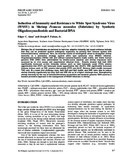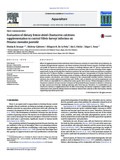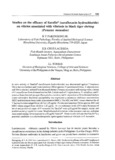| dc.contributor.author | Apines-Amar, Mary Jane | |
| dc.contributor.author | Caipang, Christopher Marlowe | |
| dc.contributor.author | Lopez, James David M. | |
| dc.contributor.author | Murillo, Ma. Novie A. | |
| dc.contributor.author | Amar, Edgar | |
| dc.contributor.author | Piñosa, Lily Anne G. | |
| dc.contributor.author | Pedroso, Fiona | |
| dc.date.accessioned | 2022-08-11T07:12:15Z | |
| dc.date.available | 2022-08-11T07:12:15Z | |
| dc.date.issued | 2022-08-10 | |
| dc.identifier.citation | Apines-Amar, M. J. S., Caipang, C. M. A., Lopez, J. D. M., Murillo, Ma. N. A., Amar, E. C., Piñosa, L. A. G., & Pedroso, F. L. (2022). Proteus mirabilis (MJA 2.6S) from saline-tolerant tilapia exhibits potent antagonistic activity against Vibrio spp., enhances immunity, controls NH levels and improves growth and survival in juvenile giant tiger shrimp, Penaeus monodon. Aquaculture Research, 53(16), 5510–5520. https://doi.org/10.1111/are.16033 | en |
| dc.identifier.issn | 1355-557X | |
| dc.identifier.uri | http://hdl.handle.net/10862/6349 | |
| dc.description | Online Version of Record before inclusion in an issue. | en |
| dc.description.abstract | Of several isolates from saline-tolerant tilapia exhibiting anti-vibrio activity, an isolate that demonstrated inhibitory activity with the biggest zone of inhibition against the shrimp pathogens, Vibrio harveyi and V. parahaemolyticus were chosen and investigated in this study. The isolate showed significant inhibition against the shrimp pathogens, V. harveyi and V. parahaemolyticus in a competitive assay. Upon 16S rRNA sequencing, the isolate was identified as putative Proteus mirabilis (MJA 2.6S). P. mirabilis (MJA 2.6S) exhibited extracellular protease, cellulase and amylase activities. Pathogenicity tests showed that it was not pathogenic to the shrimp even at the highest concentration of 108 CFU ml−1. Further, P. mirabilis (MJA 2.6S) improved growth and survival, stimulated higher phenoloxidase and bactericidal activities in the shrimp host and protected it from V. harveyi experimental infection. In addition, the isolate P. mirabilis (MJA 2.6S) significantly reduced the ammonia level of the pond water samples in vitro. Taken together, the results clearly showed the strong probiotic potential of P. mirabilis (MJA 2.6S) in shrimp and hence further studies are needed to determine its wider application as a probiotic in P. monodon culture. | en |
| dc.language.iso | en | en |
| dc.publisher | Wiley | en |
| dc.subject | Proteus mirabilis | en |
| dc.subject | Penaeus monodon | en |
| dc.subject | Vibrio parahaemolyticus | en |
| dc.subject | prawns and shrimps | en |
| dc.subject | tilapia | en |
| dc.subject | pathogenicity | en |
| dc.subject | immune response | en |
| dc.subject | amylases | en |
| dc.subject.lcsh | Proteolytic enzymes | en |
| dc.subject.lcsh | Cellulase | en |
| dc.title | Proteus mirabilis (MJA 2.6S) from saline-tolerant tilapia exhibits potent antagonistic activity against Vibrio spp., enhances immunity, controls \(\mathsf{NH_3}\) levels and improves growth and survival in juvenile giant tiger shrimp, Penaeus monodon | en |
| dc.type | Article | en |
| dc.citation.volume | 53 | |
| dc.citation.issue | 16 | |
| dc.citation.spage | 5510 | |
| dc.citation.epage | 5520 | |
| dc.citation.journalTitle | Aquaculture Research | en |
| dc.subject.asfa | growth | en |
| dc.subject.asfa | survival | en |
| dc.subject.asfa | ammonia | en |
| dc.subject.asfa | immunity | en |
| dc.subject.asfa | pathogens | en |
| dc.subject.asfa | toxicity | en |
| dc.subject.asfa | toxicity tests | en |
| dc.subject.asfa | haemolymph | en |
| dc.subject.asfa | enzymes | en |
| dc.subject.asfa | bioremediation | en |
| dc.subject.asfa | probiotics | en |
| dc.identifier.essn | 1365-2109 | |
| dc.identifier.doi | 10.1111/are.16033 | |
| dc.subject.scientificName | Proteus mirabilis | en |
| dc.subject.scientificName | Penaeus monodon | en |
| dc.subject.scientificName | Vibrio harveyi | en |
| dc.subject.scientificName | Vibrio parahaemolyticus | en |
| local.subject | aquaculture | en |
| local.subject | bioremediation | en |
| local.subject | probiotics | en |
| local.subject | Proteus mirabilis | en |
| local.subject | shrimp immunity | en |
| local.subject | Phenoloxidase | en |
| local.subject | protease | en |



